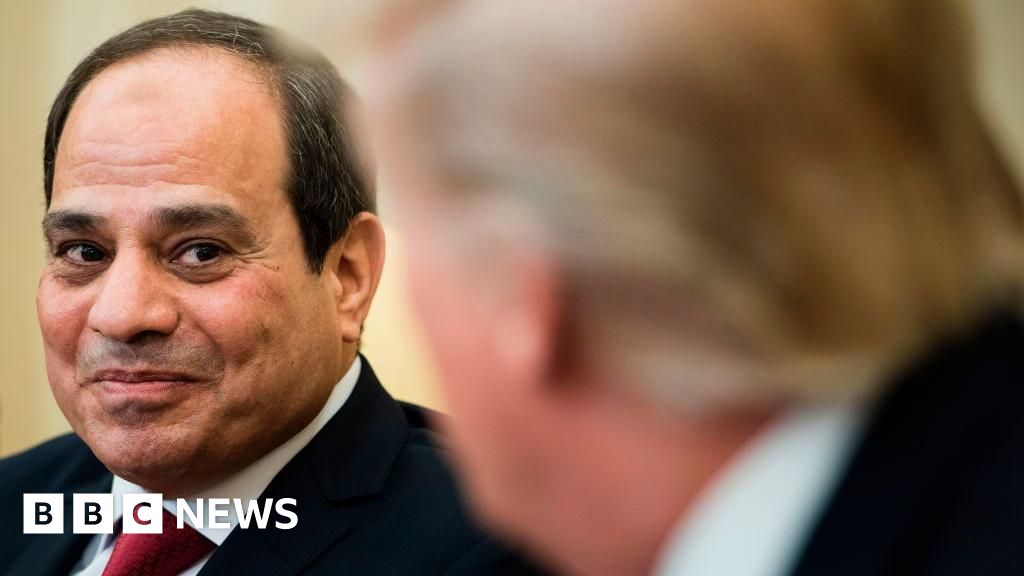
In the vibrant center of Cairo, coffee shops are bustling with Gazans who managed to escape at the beginning of Israel’s devastating conflict with Hamas. While they have found refuge, their hearts are heavy with concern for family members still in danger back home.
Recently, Egyptian intelligence officials have engaged in discussions with Hamas leaders to reinforce the fragile ceasefire. Many Egyptians, glued to news updates, feel an acute sense of their country’s significant involvement in the ongoing turmoil in Gaza.
Yet, as President Trump’s unexpected post-war proposal suggests relocating two million Palestinians to “a parcel of land” in Egypt and Jordan for U.S. territorial control, fears of a looming crisis intensify.
During Friday prayers, many worshippers express that Trump’s proposal requires serious reconsideration.
Abdo, a civil engineer, commented, “This would simply shift the battlefront from their soil to ours! The Israeli military and Palestinian factions have an everlasting conflict, and any alignment with Israel here could provide them a reason to justify their actions in the name of self-defense.”
Others argue that permanently relocating Gazans would undermine the Palestinian pursuit of statehood, potentially inciting extremism and destabilizing Egypt.
In response, President Abdel Fattah al-Sisi has initiated a behind-the-scenes diplomatic campaign, facing one of his leadership’s most trying challenges—one that could redefine Egypt’s relations with essential Western allies.
Egypt is weighing the potential risks to its longstanding peace agreement with Israel—an arrangement long seen as a pillar of both regional stability and U.S. influence in the Middle East.
Since the landmark 1979 treaty, Washington has considered Cairo a vital partner, resulting in significant U.S. military assistance—1.3 billion dollars allocated just last year as part of this arrangement.
However, critics on prominent Egyptian talk shows are voicing their skepticism about this military aid. Ahmed Mousa, a well-known television personality, recently claimed that this assistance holds little value for Egypt, emphasizing that Egyptians will not submit to pressure or threats.
In contrast to Jordan’s King Abdullah II, who recently met with Trump and embraced a conciliatory stance while agreeing to host sick Gazan children, Sisi has refused to visit Washington while the issue of displacement is on the table—although U.S. officials maintain that no visit has been scheduled.
The economic fallout from the conflict has also hit Egypt hard, with the nation reporting an $8 billion loss in Suez Canal revenues due to Houthi attacks on vessels in the Red Sea, which have intensified as a response to Israel’s military actions in Gaza.
Egypt now hopes that by formulating its own reconstruction plan for Gaza, it can both avert the contentious mass displacement of Palestinians and stimulate its economy.
Real estate mogul Hisham Talaat Moustafa, a close ally of Sisi, has proposed an ambitious $20 billion scheme to construct 200,000 homes in Gaza within three years without relocating any residents.
Professor Mustafa Kamel al-Sayyid of Cairo University believes the plan is executable, suggesting, “It’s certainly feasible for Egyptians to identify safe locations where Palestinian families can stay during the reconstruction of their homes in Gaza.”
He adds that various innovative concepts have emerged, including utilizing rubble as building material for the reconstruction efforts.
As U.S. Secretary of State Marco Rubio prepares for a Middle East trip, he has acknowledged that Arab nations are largely opposed to Trump’s plan for Gaza. “If anyone has a better proposal, the time to present it is now,” he stated.
Leaders from several Arab nations are expected to convene soon in Saudi Arabia, with Egypt calling for an Arab summit in Cairo on February 27 to discuss an alternative comprehensive vision for Gaza.
Reportedly, these proposals could entail the establishment of a Gulf-led fund to support reconstruction efforts, while also sidelining Hamas, as both Israel and the U.S. have made clear the necessity for the Palestinian group to have no role moving forward.
Egypt’s strategy includes training a new security force and selecting Palestinian technocrats—unaffiliated with any political factions—to spearhead early recovery initiatives.
However, devising an arrangement that satisfies Israel’s hardline administration will be a daunting task.
Former U.S. Secretary of State Antony Blinken imagines a role for global powers and the United Nations in Gaza until the Palestinian Authority (PA), which governs sections of the West Bank, can resume control. However, Israeli Prime Minister Benjamin Netanyahu has opposed any PA involvement, resisting the notion of Palestinian statehood.
Egypt, alongside other Arab nations, remains unwavering in its commitment to the internationally recognized two-state solution, envisioning an independent Palestinian state existing alongside Israel. The Egyptian foreign ministry has expressed a desire to collaborate with President Trump to foster a fair and comprehensive resolution regarding the Palestinian situation.
As worshippers linger outside a mosque in Cairo, they emphasize the importance of avoiding the grim patterns of history.
Currently, Egypt claims to host over 100,000 Gazans, and the prospect of accepting even more raises significant concerns. Some fear that this could turn their nation into a stronghold for Hamas—a group ideologically connected to Egypt’s own banned Muslim Brotherhood—potentially fueling internal unrest.
Ultimately, there is considerable public support for Egypt to adopt a decisive stance against U.S. proposals.
A local shop owner, choosing to remain anonymous, voiced concerns, “Life is already growing more difficult with the refugees we have. Just imagine if we accept more! The Palestinians should thrive on their own land, not ours. We don’t need anything from the U.S. I stand with Sisi and the government, and we are prepared to face whatever comes our way.”









